-
Posts
3,706 -
Joined
-
Last visited
-
Days Won
22
Reputation Activity
-
 karelm reacted to Will in The Classical Music Recommendation Thread
karelm reacted to Will in The Classical Music Recommendation Thread
How do you even think up something like this passage?!
-
 karelm reacted to JNHFan2000 in Kevin Costner’s new epic western “Horizon” (2023)
karelm reacted to JNHFan2000 in Kevin Costner’s new epic western “Horizon” (2023)
COMPOSER ANNOUNCEMENT:
JOHN DEBNEY!
Wonderful news in my opinion.
-
 karelm reacted to Thor in The Christopher Young Appreciation Thread
karelm reacted to Thor in The Christopher Young Appreciation Thread
I don't know, but HELLRAISER is one of the best horror scores ever written. Just wanted to nudge that in there.
-
 karelm reacted to Tom Guernsey in The Christopher Young Appreciation Thread
karelm reacted to Tom Guernsey in The Christopher Young Appreciation Thread
For sure, but not all remasters are created equally plus the relative lack of discussion about these releases made me wonder that's all... I'm sold, they are great scores!
-
 karelm got a reaction from Mr. Hooper in The Fury vs Dracula
karelm got a reaction from Mr. Hooper in The Fury vs Dracula
I wouldn't say that but they both went the Herrmann route. Young was doing gothic horror, more the stuff from the 1940's and 50's by way of Herrmann who frequently seemed to use dance rhythms (waltz) in his suspense and horror films. I think this Herrmann approach is what JW was asked to do in The Fury too since Brian DePalma worshipped Hitch and was channeling that vibe. I think if Herrmann were still alive, DePalma would have hired him to score The Fury and not JW. Johnny might have been hired for one very major reason...Hitch's last film (Family Plot, 1976) was scored by Williams so there might have been a presumption that JW was the heir apparent to Herrmann. In DePalma's Obsession, Herrmann wrote a main theme as a waltz. It's pretty clear, DePalma wanted Johnny to do that Herrmann thing in Fury.
-
 karelm got a reaction from Andy in The Fury vs Dracula
karelm got a reaction from Andy in The Fury vs Dracula
I wouldn't say that but they both went the Herrmann route. Young was doing gothic horror, more the stuff from the 1940's and 50's by way of Herrmann who frequently seemed to use dance rhythms (waltz) in his suspense and horror films. I think this Herrmann approach is what JW was asked to do in The Fury too since Brian DePalma worshipped Hitch and was channeling that vibe. I think if Herrmann were still alive, DePalma would have hired him to score The Fury and not JW. Johnny might have been hired for one very major reason...Hitch's last film (Family Plot, 1976) was scored by Williams so there might have been a presumption that JW was the heir apparent to Herrmann. In DePalma's Obsession, Herrmann wrote a main theme as a waltz. It's pretty clear, DePalma wanted Johnny to do that Herrmann thing in Fury.
-
 karelm got a reaction from MikeH in Music theory question
karelm got a reaction from MikeH in Music theory question
Yes. At 90+ years old, he's an encyclopedia of these chords and scales he's obsessed over for 80+ years. I very much doubt scales and chords are something he has to put much thought into these days. Here is an analogy. Playing side by side with a professional level musician, they played a fiendishly exposed and difficult passage without breaking a sweat. I asked, didn't playing that even make you nervous a little bit? They said absolutely - but the items they were nervous about were no longer about hitting the right notes or rhythms. They worked that all out over decades. They were nervous about bringing something fresh and musical into something they had played thousands of times. So, a beginner might be fretting over the obvious items like hitting the right note. A mid level musician might focus just as much about tempo, phrasing, and dynamics but less worried they'll hit the right notes. A professional level player might play the same passage now worried about doing the passage artistic justice and giving it the dynamic flare it needs though they've played it a thousand times. At each level, the musician is stressing over the same passage and are working through issues but those aren't the same issues at all. As a beginner you might think, it's crazy to imagine the pro doesn't have to worry about hitting the right notes. They've moved past those obvious issues and are now focused on more nuanced challenges we might not even notice yet. That is the analogy I'm making with JW. He's at that point compositionally. I seriously doubt he scratches his head wondering what that chord was or how to spell it because he's been doing that already for decades and now knows if I need something for a scene with a specific feel, C#min7+#9+#11 would work great right there. Some would see this as it comes easy for him but it doesn't. He just spent many, many years already working through the basic issues. There are very few people in any capacity who will reach this level of accomplishment.
-
 karelm got a reaction from Martinland in Music theory question
karelm got a reaction from Martinland in Music theory question
Yes. At 90+ years old, he's an encyclopedia of these chords and scales he's obsessed over for 80+ years. I very much doubt scales and chords are something he has to put much thought into these days. Here is an analogy. Playing side by side with a professional level musician, they played a fiendishly exposed and difficult passage without breaking a sweat. I asked, didn't playing that even make you nervous a little bit? They said absolutely - but the items they were nervous about were no longer about hitting the right notes or rhythms. They worked that all out over decades. They were nervous about bringing something fresh and musical into something they had played thousands of times. So, a beginner might be fretting over the obvious items like hitting the right note. A mid level musician might focus just as much about tempo, phrasing, and dynamics but less worried they'll hit the right notes. A professional level player might play the same passage now worried about doing the passage artistic justice and giving it the dynamic flare it needs though they've played it a thousand times. At each level, the musician is stressing over the same passage and are working through issues but those aren't the same issues at all. As a beginner you might think, it's crazy to imagine the pro doesn't have to worry about hitting the right notes. They've moved past those obvious issues and are now focused on more nuanced challenges we might not even notice yet. That is the analogy I'm making with JW. He's at that point compositionally. I seriously doubt he scratches his head wondering what that chord was or how to spell it because he's been doing that already for decades and now knows if I need something for a scene with a specific feel, C#min7+#9+#11 would work great right there. Some would see this as it comes easy for him but it doesn't. He just spent many, many years already working through the basic issues. There are very few people in any capacity who will reach this level of accomplishment.
-
 karelm got a reaction from Jilal in Music theory question
karelm got a reaction from Jilal in Music theory question
Yes. At 90+ years old, he's an encyclopedia of these chords and scales he's obsessed over for 80+ years. I very much doubt scales and chords are something he has to put much thought into these days. Here is an analogy. Playing side by side with a professional level musician, they played a fiendishly exposed and difficult passage without breaking a sweat. I asked, didn't playing that even make you nervous a little bit? They said absolutely - but the items they were nervous about were no longer about hitting the right notes or rhythms. They worked that all out over decades. They were nervous about bringing something fresh and musical into something they had played thousands of times. So, a beginner might be fretting over the obvious items like hitting the right note. A mid level musician might focus just as much about tempo, phrasing, and dynamics but less worried they'll hit the right notes. A professional level player might play the same passage now worried about doing the passage artistic justice and giving it the dynamic flare it needs though they've played it a thousand times. At each level, the musician is stressing over the same passage and are working through issues but those aren't the same issues at all. As a beginner you might think, it's crazy to imagine the pro doesn't have to worry about hitting the right notes. They've moved past those obvious issues and are now focused on more nuanced challenges we might not even notice yet. That is the analogy I'm making with JW. He's at that point compositionally. I seriously doubt he scratches his head wondering what that chord was or how to spell it because he's been doing that already for decades and now knows if I need something for a scene with a specific feel, C#min7+#9+#11 would work great right there. Some would see this as it comes easy for him but it doesn't. He just spent many, many years already working through the basic issues. There are very few people in any capacity who will reach this level of accomplishment.
-
 karelm got a reaction from GerateWohl in Music theory question
karelm got a reaction from GerateWohl in Music theory question
Yes. At 90+ years old, he's an encyclopedia of these chords and scales he's obsessed over for 80+ years. I very much doubt scales and chords are something he has to put much thought into these days. Here is an analogy. Playing side by side with a professional level musician, they played a fiendishly exposed and difficult passage without breaking a sweat. I asked, didn't playing that even make you nervous a little bit? They said absolutely - but the items they were nervous about were no longer about hitting the right notes or rhythms. They worked that all out over decades. They were nervous about bringing something fresh and musical into something they had played thousands of times. So, a beginner might be fretting over the obvious items like hitting the right note. A mid level musician might focus just as much about tempo, phrasing, and dynamics but less worried they'll hit the right notes. A professional level player might play the same passage now worried about doing the passage artistic justice and giving it the dynamic flare it needs though they've played it a thousand times. At each level, the musician is stressing over the same passage and are working through issues but those aren't the same issues at all. As a beginner you might think, it's crazy to imagine the pro doesn't have to worry about hitting the right notes. They've moved past those obvious issues and are now focused on more nuanced challenges we might not even notice yet. That is the analogy I'm making with JW. He's at that point compositionally. I seriously doubt he scratches his head wondering what that chord was or how to spell it because he's been doing that already for decades and now knows if I need something for a scene with a specific feel, C#min7+#9+#11 would work great right there. Some would see this as it comes easy for him but it doesn't. He just spent many, many years already working through the basic issues. There are very few people in any capacity who will reach this level of accomplishment.
-
 karelm got a reaction from Loert in Music theory question
karelm got a reaction from Loert in Music theory question
Yes. At 90+ years old, he's an encyclopedia of these chords and scales he's obsessed over for 80+ years. I very much doubt scales and chords are something he has to put much thought into these days. Here is an analogy. Playing side by side with a professional level musician, they played a fiendishly exposed and difficult passage without breaking a sweat. I asked, didn't playing that even make you nervous a little bit? They said absolutely - but the items they were nervous about were no longer about hitting the right notes or rhythms. They worked that all out over decades. They were nervous about bringing something fresh and musical into something they had played thousands of times. So, a beginner might be fretting over the obvious items like hitting the right note. A mid level musician might focus just as much about tempo, phrasing, and dynamics but less worried they'll hit the right notes. A professional level player might play the same passage now worried about doing the passage artistic justice and giving it the dynamic flare it needs though they've played it a thousand times. At each level, the musician is stressing over the same passage and are working through issues but those aren't the same issues at all. As a beginner you might think, it's crazy to imagine the pro doesn't have to worry about hitting the right notes. They've moved past those obvious issues and are now focused on more nuanced challenges we might not even notice yet. That is the analogy I'm making with JW. He's at that point compositionally. I seriously doubt he scratches his head wondering what that chord was or how to spell it because he's been doing that already for decades and now knows if I need something for a scene with a specific feel, C#min7+#9+#11 would work great right there. Some would see this as it comes easy for him but it doesn't. He just spent many, many years already working through the basic issues. There are very few people in any capacity who will reach this level of accomplishment.
-
 karelm reacted to Loert in Music theory question
karelm reacted to Loert in Music theory question
I think he has both in mind... I think JW is quite an instinctive composer, and he will basically do whatever is needed to write the music he wants.
-
 karelm reacted to Loert in Music theory question
karelm reacted to Loert in Music theory question
Yep, I noticed he loves doing it in the brass too! I think it sounds great in the mid-register horns especially. I do think it comes from a big-band way of scoring, where if you have 4 horns (as JW usually does), then each horn plays a different note to avoid doubling any one pitch and thus avoiding un-even volume across the pitches. But this gives the nice side-effect of producing a 4-note harmony.
-
 karelm reacted to Alex in Maestro (Bradley Cooper 2023) formerly Steven Spielberg's Possible Leonard Bernstein Biopic
karelm reacted to Alex in Maestro (Bradley Cooper 2023) formerly Steven Spielberg's Possible Leonard Bernstein Biopic
I am looking forward to the Williams family releasing a statement when JW’s biographic film is released confirming that “John Williams had a nice, bald head.”
-
 karelm reacted to JNHFan2000 in Maestro (Bradley Cooper 2023) formerly Steven Spielberg's Possible Leonard Bernstein Biopic
karelm reacted to JNHFan2000 in Maestro (Bradley Cooper 2023) formerly Steven Spielberg's Possible Leonard Bernstein Biopic
This looks great!
-
 karelm reacted to Jurassic Shark in Classical Music News
karelm reacted to Jurassic Shark in Classical Music News
A previously unknown version of Karelia as revised by Jean Sibelius has been unearthed
Can't wait to hear it!
-
 karelm got a reaction from tmarps in Strange Arpeggios
karelm got a reaction from tmarps in Strange Arpeggios
Yes, welcome and this is a favorite topic of many of us here. Basically, how did he know to do that thing he did. This particular instance is a very famous "spacey" example and is a space cliche (time honored tradition). He's immediately setting the location of distant, mysterious location using musical tropes of polytonality just like others did before every time they wanted to evoke the same thing. The lesson here is that JW didn't invent this but studied this. Many other works do this exact same thing as Loert points out. Holst's Planets which you absolutely must study but also Vaughan Williams Sinfonia Antarctica which similarly referenced this vernacular. Major up high and minor a half step above down below is suggestive of mysteries expansiveness. In Holst, Neptune uses E minor in the trumpets and G# major in the trombones. This works because it's tonally unsettling. You have E, G, B, G#, C, D# (everything's a half step off) this minor second is unsettling but separated in tonal space just feels otherworldly. We can even dive in to this deeper by showing that dissonances separated are more pleasing. Of course, JW knew this. He wasn't looking for harshness but for ambiguity...setting the stage most succinctly. Every great artist looks to say the most with the least words. JW did so musically in the example you are asking about.
-
 karelm reacted to Naïve Old Fart in What is the last piece of classical music you listened to?
karelm reacted to Naïve Old Fart in What is the last piece of classical music you listened to?
Prokofiev SYMPHONY#3, on BBC Radio 3.
Not bad. Not bad, at all.
-
 karelm got a reaction from Tom Guernsey in What is the last piece of classical music you listened to?
karelm got a reaction from Tom Guernsey in What is the last piece of classical music you listened to?
Very fine tonal contemporary music. If you like Shostakovich, Prokofiev, and Rachmaninoff, you will find much to enjoy here in this dramatic and epic symphony.
-
 karelm got a reaction from Loert in Strange Arpeggios
karelm got a reaction from Loert in Strange Arpeggios
That's a really good point you made. To analyze harmony, you have to include melody otherwise you miss context of what's happening. How it goes from chord to chord does impact how you think of this contextually. Music exists in a multi-planal existence...it is multidimensional like time, space, gravity, mass, energy, etc. To understand melody, you need to keep harmony, melody, rhythm, and structure all in mind. To understand what is happening harmonically, you need to observe melody and rhythm too. Great point, Loert!
-
 karelm got a reaction from Jay in Strange Arpeggios
karelm got a reaction from Jay in Strange Arpeggios
That's a really good point you made. To analyze harmony, you have to include melody otherwise you miss context of what's happening. How it goes from chord to chord does impact how you think of this contextually. Music exists in a multi-planal existence...it is multidimensional like time, space, gravity, mass, energy, etc. To understand melody, you need to keep harmony, melody, rhythm, and structure all in mind. To understand what is happening harmonically, you need to observe melody and rhythm too. Great point, Loert!
-
 karelm reacted to Loert in Strange Arpeggios
karelm reacted to Loert in Strange Arpeggios
I think this is one of those instances where "labelling" the melody line with chord symbols based on the bass line may obscure what's happening.
I think Williams knew that he wanted a climactic, "Americana" instance of the last three notes of the Mission Theme, and he decided that there was going to be some kind of extended harmony involved. And I think all that Williams did was move vertically downwards from the melody line, building up the harmony that way.
For example, for the first note, we could harmonize it like Bbmaj7 with the A at the top...because we like maj7s, and it keeps us in the right key (as opposed to, say, Dmaj7, with the A on top, which would take us out of the key).
But Bbmaj7 doesn't sound rich enough. So we can keep going down, first to G (Gm9), then Eb (Ebmaj#11). We could still have gone down to C (Cm13), but JW didn't.
The next note might have been built downwards the same way. JW decided to stop at Ab this time, thus giving us a 13th chord, "richer" than the preceding 11th. So we get a buildup in harmonic richness before arriving at the tonic.
But here's the thing with the final chord: we could have gone down to F, in which case the bass would in fact be the dominant tone. And if you add the extra F at the bottom, it really doesn't sound that different from the final result (far less noticeable than if you had changed the top note, for instance). So, in fact, it is a kind of v -> I cadence, only you can say that JW left out the bass note, thus replacing the v with a chord of somewhat air-ier, more ambiguous quality.
Anyway, this is how I would think about that passage in particular. Using chord symbols makes the most sense IMO when you have a meaningful bass line, but in this particular case I would argue that there is no "bass line" as such.
-
 karelm got a reaction from Trope in Strange Arpeggios
karelm got a reaction from Trope in Strange Arpeggios
Yes, welcome and this is a favorite topic of many of us here. Basically, how did he know to do that thing he did. This particular instance is a very famous "spacey" example and is a space cliche (time honored tradition). He's immediately setting the location of distant, mysterious location using musical tropes of polytonality just like others did before every time they wanted to evoke the same thing. The lesson here is that JW didn't invent this but studied this. Many other works do this exact same thing as Loert points out. Holst's Planets which you absolutely must study but also Vaughan Williams Sinfonia Antarctica which similarly referenced this vernacular. Major up high and minor a half step above down below is suggestive of mysteries expansiveness. In Holst, Neptune uses E minor in the trumpets and G# major in the trombones. This works because it's tonally unsettling. You have E, G, B, G#, C, D# (everything's a half step off) this minor second is unsettling but separated in tonal space just feels otherworldly. We can even dive in to this deeper by showing that dissonances separated are more pleasing. Of course, JW knew this. He wasn't looking for harshness but for ambiguity...setting the stage most succinctly. Every great artist looks to say the most with the least words. JW did so musically in the example you are asking about.
-
 karelm reacted to Omen II in What Live To Projection concerts have you seen and not seen?
karelm reacted to Omen II in What Live To Projection concerts have you seen and not seen?
I had the pleasure of attending a live to picture performance of Things to Come (1936) with the London Symphony Orchestra playing Arthur Bliss's amazing score at the Barbican yesterday. Both the film and score are two of my absolute favourites and I never dreamed that I would one day be able to witness the whole score played live to picture.
The film opens with the London Films logo and it was great to hear one of the percussionists play the logo music - essentially the chimes of Big Ben - on the tubular bells! For those of you familiar with the score, the LSO also played the Christmas carols heard near the beginning of the film (with the choir heard on the film soundtrack) and gave us the whole of the famous march to lead into the interval. Better still, at the end of the film the orchestra played the entire Epilogue music, one of my favourite pieces of film music ever. Frank Strobel conducted.
Interestingly, the film itself had subtitles only for the sequences in which dialogue is underscored, while the scenes without music played without subtitles. The film is scarily prophetic, predicting war in Europe, helicopters, a global pandemic, the European Union, the moon landing and even smart watches and tablets.
-
 karelm reacted to Tom Guernsey in STAR WARS - Live To Projection Concerts
karelm reacted to Tom Guernsey in STAR WARS - Live To Projection Concerts
"Anakin always pulled that face when hitting the lowest notes when portraying Siegfried in Götterdämmerung".

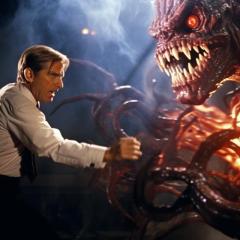

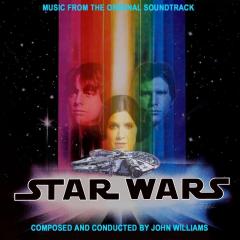
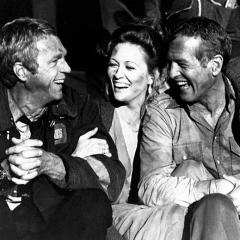



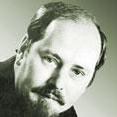

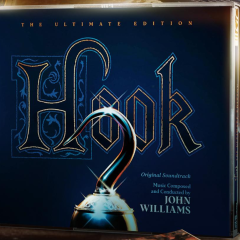
20thAnniversaryEdition.thumb.jpg.8f332140a7f08dd3051d720e581d69e5.jpg)